Reading Schedule
It should be stated that the novel itself is not difficult to comprehend. As the writing is concise, clear and dynamic, I have read it over the course of three days, spending an hour each day (Picture 1). However, the author used satire extensively, which complicated the comprehension at first. Therefore, I dedicated an hour for the consecutive two days to reread the novel and understand what the author has tried to convey. Altogether, reading the book took me five days, including the time spent on reflecting on the text.
Picture 1.
Reasons for Choosing the Novel
I have chosen this novel because of the extensive social commentary, which pertains to contemporary society (Picture 2). Lawrence Hill is a famous social activist with volunteering experience, which means that all his writing is based on real life challenges and problems. Furthermore, the novel is not overly complex, thus it is fairly easy to read and analyze. The authorial conceit is an attractive one because the setting of the book comprises fictional countries in Indian Ocean. As a result, the author has the ability to connect the novel’s storyline to real events and tendencies without explicitly criticizing any government. Such flexibility appealed to me because it enabled me to interpret Hill’s critique of refugee policies in relation to almost any modern state.

Character Growth and Development
There are two main characters in the book, with Keita Ali (Picture 3) being a protagonist to whom the title refers and Viola Hill being a supporting protagonist. In the same manner as the plot of the book is dynamic and twisting, the main character also undergoes considerable growth (Picture 4). In the first third of the novel, Keita Ali is a young enthusiastic black man, who sees running as a way to get rich and escape poverty. He lives according to the morals his parents taught to him, which was commitment to running, as this is the only way for him to succeed in the fictional country Zantoroland. Keita is attached to his family and loathes his country, which is presented as a state run by a corrupt government.


The second third of the book adds a new layer to Keita’s personality – the desire to save his sister. Whereas previously, Keita saw running as a way to become rich, at this point, it is a means of his survival. Keita embraces his new identity of an illegal migrant, trying to make a living via running. Keita realizes that the Freedom State – the fictional wealthy country he immigrated to – is as corrupt as Zantoroland. As a result, Keita has only his exceptional running abilities to trust in. The final third of the novel completes Keita’s transformation as he succeeds in saving his sister and realizing that both governments are corrupt and cannot be trusted.
Viola Hill is a leading character in the second part of the novel. Unlike Keita, she is more static since her development is not as evident (Picture 5). She is introduced to the reader as a journalist researching the death of Keita’s father. She uncovers evidence of governmental corruption and uses it to send the prime ministers of both countries to prison. Although Viola executes a significant feat, she does not grow as a character because she reaches the conclusion of her storyline in the exact same state in which she started.
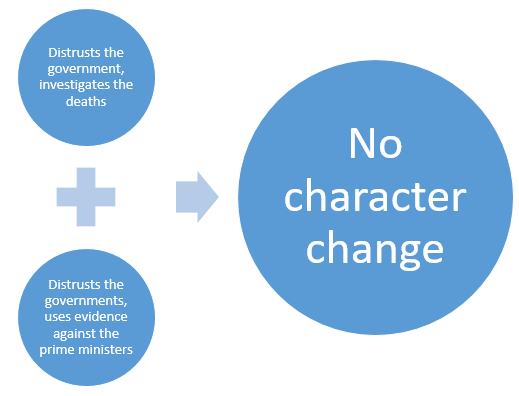
Biographical and Historical Context
Lawrence Hill is a Canadian author, who writes fiction and essays on numerous political and social themes (Picture 6). Born in 1957, Hill has always been obsessed with the refugees and the policies concerning migration. He was substantially influenced by his parents, both of whom had been heavily involved in human rights movements (Picture 7). Hill has an experience of working as a volunteer promoting and supporting women’s rights in Africa. During childhood, he had a dream of becoming an elite Olympic runner. All of these fascinations and experiences are reflected in The Illegal, which combines running, migration, human rights into a single novel with extensive social commentary.
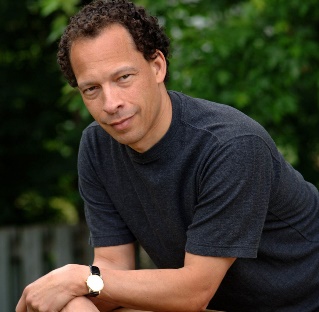
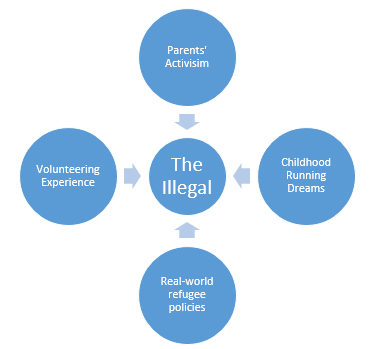
The novel itself was written in 2015, however, the actual production began years before the publication. Hill entertained the idea of writing a fictional book on the theme of migrants as far back as the eighties. Around this time, he met the Sudanese refugees in West Berlin. Hill actively promotes awareness of racial issues, which are evident by the fact that the identities of all his characters are linked to race and ethnicity. The contemporary refugee policies of Canada, Texas, Arizona, France and South Africa constitute the historical context of the novel.
Notes on Resilience
Resilience is a critical ability of the human mind to manage stressful situations and overcome crises. It is a vitally important trait in modern society, which is forces people to deal with such mentally and physically pressuring issues as migration, racism, prejudices, crime, corruption, and other negative aspects of life (Aburn et al. 980). Many individuals experience maltreatment and face a hostile predisposition towards them. Resilience is the mind’s weapon to withstand such hardships and overcome them without severe mental or physical damage.
All of these challenges are present in The Illegal, as well as the mental traits necessary to withstand the obstacles. The narrative is structured around the constant struggle of the characters. Keita’s father is a journalist, who criticizes the policies of Zantoroland for which he is detained and is ultimately killed. Yet, he continues to hold to his viewpoints and ideas despite the threats and governmental persecution (Hill 41). Keita himself is a self-trained marathon runner, who exercises resilience both in running and everyday life, as it is evident in the iconic phrase “Run, Keita. Just Run” (Hill 18). Similarly to Keita’s father, Viola is a persecuted journalist, who perseveres detainment, escapes and uncovers evidence of the officials’ crimes (Hill 128). Her willpower is especially evident when she state that she continued to do her duty even after she “lost the use of [her] legs” (Hill 81). All characters share the trait of resilience, which helps them mitigate the negativity of life.
The themes of the novel include immigration, prosecution, refugee policy, governmental corruption, and family loss. All of them presuppose a certain degree of struggle and psychological pressure. Not only do the characters have to deal with extreme pressure, but they also have to recuperate and help the people close to them. As a result, it can be concluded that resilience is the central psychological theme of the novel. Considering the ultimate outcome of the storylines, it is reasonable to claim that the author attempts to convince the audience that with enough determination and resilience, a person can save their loved ones.
Analysis of Novel
Overall, there are two literary lenses influencing Lawrence Hill’s writing, which are biographical and socio-economic. Readers acquainted with Hill’s biography will immediately recognize his personal experiences in the novel’s characters. The journalist Viola Hill bears his surname, Keita strives to become an Olympic marathon gold winner, which was also the author’s childhood dream, and similarly to Hill himself several characters detest discrimination of black people (Picture 8).
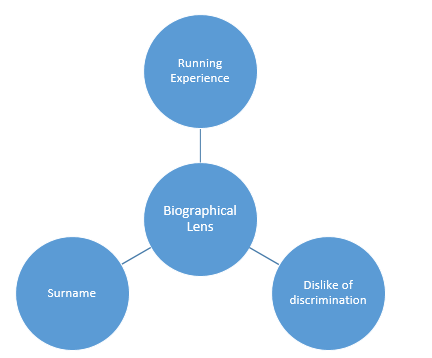
The socio-economic lens helps the reader understand why people of Zantoroland have to run marathons to make a living (Picture 9). Within the setting, the country produces the best marathon runners in the world, and those who win the Olympic gold medals are awarded with an apartment and a stable coaching job. Everyone else has to live a life of poverty, in which running is seen as luxury because a person who runs can afford new running shoes. The closest country The Freedom State represents a beacon of hope for the impoverished inhabitants of Zantoroland. The desire to escape from a poor and authoritarian state is a frequently seen modern attitude, indicating people’s response to governmental corruption.
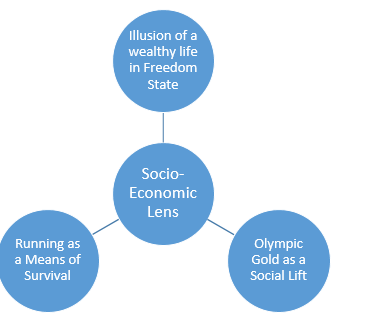
Text-to-Text Connections
The setting of the novel is partially fictional, meaning that a number of names are based on the real world. For example, AfricTown resembles the real-life historic settlement Africville in Halifax (Walmsley). Keita’s race is a mix of Bamileke and a fictional ethnicity Faloo, which may be a reference to a book The Exiles of Faloo (Walmsley). Keita’s surname indicates a Muslim origin, while Viola’s surname is a shout-out to the author himself.
Comprehension of Writing
I like the author’s writing because of the easy comprehension and use of satire. The novel is 400 pages long and it does not feel its length due to the way Hill tells the story. Even the second part, which is not centered around Keita at all, is light and understandable. Hill uses the text to describe both the environment and the characters’ thoughts interchangeably, which is reminiscent of the actual flow of thoughts. Subsequently, reading is quick, immersive, and engaging, thus constituting its appeal to me.
Reasons for Reading
I chose to read this book because the author is a proven writer who is not afraid of highlighting societal problems in a fictional novel. Hill’s previous book The Book of Negroes was particularly successful and was responsible for my knowledge of Hill’s works. I also liked the concept of using fictional countries in the real world setting, because it allows both the writer and the audience to interpret social illusions in any way compared to a setting where a particular country is criticized.
Feelings
As I read, I felt a strong connection to Keita and admiration towards his determination. As I like running myself, I could easily connect with his physical and mental struggles on track. Other characters were also engaging, particularly, Keita’s father, who did not fear the authorities. However, the character that appealed to me most was the madam of a brothel Lula, who dealt in human trafficking, yet used employment and dwelling opportunities as justification for her activities. Overall, the novel has forced to dwell on the issues of migration and poverty in the real world, which indicates that the reading had been an insightful experience.
Works Cited
Aburn, Gemma, et al. “What is Resilience? An Integrative Review of the Empirical Literature.” Journal of Advanced Nursing, vol. 72, no. 5, 2016, pp. 980-1000.
Hill, Lawrence. The Illegal. HarperCollins Publishers, 2015.
Walmsley, Ann. “Run, Keita, Run.” Literary Review of Canada. 2016. Web.